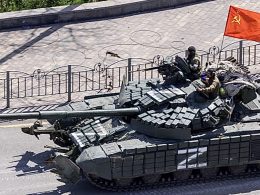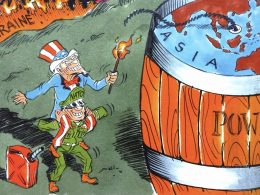Russiagate has impacted the thinking of leftists, and even many who call themselves communists, in more ways than they’d like to believe. Everyone with at least some awareness of the Democratic Party’s corruption and hypocrisy has recognized how deranged liberals have become about Russia during the last decade. So leftists have tried to distance themselves from Russiagate, with its embarassing conspiratorial thinking. Yet because the left is predominantly opportunistic, it hasn’t been willing to give up Russiagate’s core belief: that if somebody is serious about challenging U.S. imperialism, and thereby supports Russia’s actions to weaken Washington’s hegemony, then they’re a reactionary.
This was the idea that came from the effort to politically police Donald Trump, where the Democrats, the corporate media, and their neocon allies accused the Trump campaign of Russian collusion to pressure him into going along with the new cold war. When Trump’s opportunism incentivized him to comply, and he became a more dangerously anti-Russian president than Obama, the imperialist narrative managers kept promoting the collusion story. Because even though they had successfully made the new cold war bipartisan, they needed to maintain a myth that justified this and all their other vile policies. The idea that our “democratic institutions” are under threat from a foreign menace, and that these institutions therefore are genuinely worthy of being called democratic, was the perfect myth. One the narrative managers still haven’t let go of.
“The myth of Russian interference in the 2016 presidential election provides a convenient escape hatch from the political, social, cultural and economic rot that plagues the U.S.,” wrote Chris Hedges this year. “The liberal class, by clinging to this conspiracy theory, is as disconnected from reality as the QAnon theorists and election deniers that support Trump. The retreat by huge segments of the population into non-reality-based belief systems leaves a polarized nation unable to communicate. Neither side speaks a language rooted in verifiable fact. This bifurcation, one I witnessed in the conflict in the former Yugoslavia, fuels the distrust and hatred between antagonistic demographics. It accelerates political disintegration and dysfunction. It is used to justify, as was true with the F.B.I. investigation of Trump, gross abuses of power.”
Because the default liberal view has come to be that Russia is a globally subversive bad actor, one which couldn’t possibly have a good reason for wanting to demilitarize a modern Nazi state, the left opportunists have had to also adopt this neocon stance in order to effectively tail the Democrats. They’ve tacitly accepted the narrative that the GOP has “sold out to Putin,” and therefore that anyone who opposes U.S. hegemony is an asset for reactionary politics.
This narrative is supported by two notions. One, that Russia’s war against Ukrainian fascism and wider pattern of defying U.S. hegemony can be attributed to Vladimir Putin as a personality. The reactionary politicians and commentators who praise Putin as an anti-woke strongman provide the liberals with a rhetorical basis for this. Because both of the partisan sides Hedges talks about share that false perception about how Russia’s anti-American turn was Putin’s idea. When you look at the historical context behind Russia’s break from Washington, you see that Putin did not set out to do this. He was originally supposed to continue Yeltsin’s project to keep Russia a U.S. client state, and he for a time wanted Russia to join NATO. Then the circumstances mandated that he become an anti-American leader, or else become unpopular among a Russian society that’s overwhelmingly anti-imperialist. This isn’t Putin’s war, it’s the Russian people’s war, a war that he did everything to delay until he could avoid doing the responsible thing no longer.
The profit interests of the Russian bourgeoisie in this war only momentarily coincide with those of the wider Russian people, who seek to combat Nazism after it took 27 million of their relatives in World War II. In the long term, Operation Z is against the favor of the country’s capitalist class, as it’s accelerating class conflict and giving the communists more influence. Besides, if your priority is anti-imperialism, the correct stance is to support an action by a non-imperialist, non-fascist country that weakens U.S. hegemony. To engage with the shallow commentary from the reactionaries who reduce this conflict to Putin, and not repudiate this personality-focused narrative, is to frame the matter in a deceptively simplistic way. A way that makes it easy to create a dichotomy between “those who oppose Putin” and “those who support Putin.” Putin is not the point. What kind of person Putin is has no relevance to whether anti-imperialists should support the special operation, our concern is whether it represents a progressive historical event (which it does).
The other notion the imperialism-compatible left operates off of is that because the pro-Russia stance of us anti-imperialists overlaps with the views on Russia of many conservatives, particularly the libertarian kinds of conservatives, for us to take this stance is to create a “red-brown alliance.” This is the argument they used to try to discredit the Rage Against the War Machine coalition, whose communist organizations are appropriately all pro-Russian. What it comes from is the idea that only those who are on the left are worth reaching out to. That if somebody doesn’t share all the “right” ideas (which according to these left gatekeepers include many liberal ideas that aren’t even compatible with genuine Marxism), then they should be discarded.
By this logic, anybody who calls themselves a libertarian shouldn’t be worked with under any circumstances, as everyone in this category is supposedly a threat towards the socialist cause whatever the context. Which is ironic coming from the same types of left sectarians who work obsessively to harm anti-imperialists, something we haven’t seen from libertarians especially during recent times. By this logic, we should make no effort to distinguish between the culture war-obsessed types of conservatives, and the ones who’ve moreso been going in an anti-imperialist direction. Even though there are plenty of communists today who in 2016 would have voted Trump, as well as many who used to be libertarians. Bernie Sanders voters are not the only types of people who’ve been coming to Marxism throughout the last decade. To pretend like they are would be to willingly make the communist movement insular, and divided to an unnecessary degree.
What the imperialism-compatible left seeks to do is drive a wedge between those who came to socialism after being liberals, and the ones who came to it after being libertarians or conservatives. Bringing these two groups to unity, and adopting a shared synthesis that includes principled anti-imperialism, doesn’t have to mean tolerating the elements that refuse to give up their reactionary beliefs.
I’ll always denounce the anti-gay and anti-trans stances of these elements, for instance, as well as their blanket rejection of the concept of tribal sovereignty. What I’ve learned is that many of the types who’ve been won over by Parenti’s proletarian patriotism argument—an argument I don’t embrace, unless it’s a broader kind of “patriotism” that’s not tied to the USA—are also repulsed by these culture warrior edgelords. How can you create a red-brown alliance with people who, by any honest argument, aren’t fascist or fascist-adjacent? There’s a difference between a fascist, and someone who doesn’t share all of your ideas at the moment. To discard anyone who has contradictions is foolish from the perspective of wanting to win the people, yet this is what the left opportunists tell us to do.
The obstinate reactionaries are a fringe, one that’s not capable of winning the people. The pro-Russian element of the communist movement is predominantly made up of actually serious Marxists, ones who reject the culture war obsession of the reactionaries in favor of prioritizing anti-imperialism above all. Because it’s obvious to them that fighting the information war against the empire’s psyops is the most meaningful thing communists can do at this stage in the class struggle.
We in this ideological element have two key differences from the right-wingers who love Putin: one, we understand that Russia’s efforts to stand up to the war machine have been carried out in spite of Putin rather than because of him, meaning it doesn’t make sense from an anti-imperialist perspective to idolize him. Especially not for a communist, as Putin is a bourgeois leader. (Putin also accomodates the anti-gay politics of the Russian Orthodox Church, a kind of practice that most communists in the 21st century have rightly come to reject.) Two, we’re not fixated on the culture war, and we encourage anyone who still is to get out of that unhealthy mindset. Our foremost priority is to combat U.S. hegemony, which entails narratively aiding Russia’s efforts to weaken it.
This does not mean we view multipolarity as the end goal, that’s another strawman the imperialism-compatible left uses against us. We view multipolarity as one of the indispensable steps towards full global victory for the working class, based on how U.S. imperialism is the globe’s primary contradiction and has to be defeated as our foremost objective. We in the core can help realize this step by disrupting the war machine’s narrative management operations, thereby making Washington’s efforts to delay the rise of multipolarity untenable.
————————————————————————
If you appreciate my work, I hope you become a one-time or regular donor to my Patreon account. Like most of us, I’m feeling the economic pinch during late-stage capitalism, and I need money to keep fighting for a new system that works for all of us. Go to my Patreon here.








